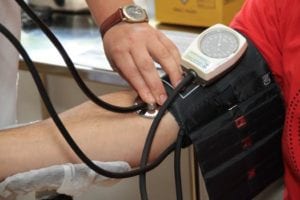Written by Joyce Smith, BS. Blood pressure medications taken at bedtime were more effective in reducing the risk of cardiovascular disease than taking blood pressure medications in the morning upon awakening.
 Several clinical trials have shown an improvement in blood pressure during sleep when hypertension medication is given in the evening before sleep rather than upon awakening 1,2 and without an increase in adverse events 3. Mounting evidence suggests that blood pressure monitored during sleep is a significantly superior prognosis marker for cardiovascular disease (CVD) risk than blood pressure taken during the daytime 4,5. The Hygia Project is a research network that was established to monitor ambulatory blood pressure as a routine procedure for the diagnosis and management of hypertension, the assessment of treatment response, and the evaluation of patient CVD risk as well as other risks 6.
Several clinical trials have shown an improvement in blood pressure during sleep when hypertension medication is given in the evening before sleep rather than upon awakening 1,2 and without an increase in adverse events 3. Mounting evidence suggests that blood pressure monitored during sleep is a significantly superior prognosis marker for cardiovascular disease (CVD) risk than blood pressure taken during the daytime 4,5. The Hygia Project is a research network that was established to monitor ambulatory blood pressure as a routine procedure for the diagnosis and management of hypertension, the assessment of treatment response, and the evaluation of patient CVD risk as well as other risks 6.
Among the many ambulatory blood pressure monitoring-based studies, the Hygia Chronotherapy Trial 7 was a multicenter, controlled, prospective, randomized, open-label, blinded endpoint trial conducted in a primary care setting in Spain. A total of 19,084 hypertensive patients (median age of 60.5) were randomized to ingest their entire daily dose of one or more hypertension medications at bedtime (n=9552) or upon morning awakening (n=9532). Initially and during every scheduled clinical visit (at least annually) throughout follow-up, morning blood pressure monitoring was performed for 48 hours.
During a median follow-up of 6.3 years, 3246 participants had a registered event, of which 1,752 participants experienced a primary CVD outcome: CVD death (n=310), myocardial infarction (n=274), coronary revascularization (n=302), heart failure (n=521), or stroke (n=345). Patients in the bedtime medication group showed a significantly lower hazard ratio for the primary CVD outcome and each of its single components than their morning medication counterpart. Specifically, those randomized to bedtime blood pressure dosing had a 45% relative reduction in the primary CVD outcome, reflecting a hazard ratio (HR) of 0.55 (95% CI 0.48-0.63), p<0.001; with similar reductions in CVD death and all-cause death. In addition, myocardial infarction (HR=0.66), strokes (HR=0.54), and heart failure (HR =0.58) were all reduced.
Routine ingestion by hypertensive patients of one or more prescribed blood pressure-lowering medications at bedtime, as opposed to upon waking, significantly decreased blood pressure during sleep and, most importantly, markedly decreased the occurrence of major CVD events.
Study limitations included the use of a homogenous Spanish population that makes generalization to other ethnicities difficult. Also, adjusting medications with ambulatory blood pressure monitors for 48 hours is a monitoring protocol that may be an uncommon practice in other medical environments.
Replication of this study using a more diverse population is warranted. Studies comparing the effectiveness of bedtime meds in lowering blood pressure versus early morning meds are important because early morning heart attacks are five to six times more common and are more severe and more often fatal.
Source: Hermida, Ramón C., Juan J. Crespo, Manuel Domínguez-Sardiña, Alfonso Otero, Ana Moyá, María T. Ríos, Elvira Sineiro et al. “Bedtime hypertension treatment improves cardiovascular risk reduction: the Hygia Chronotherapy Trial.” European heart journal (2019).
© The Authors 2019
Posted December 30, 2019.
Joyce Smith, BS, is a degreed laboratory technologist. She received her bachelor of arts with a major in Chemistry and a minor in Biology from the University of Saskatchewan and her internship through the University of Saskatchewan College of Medicine and the Royal University Hospital in Saskatoon, Saskatchewan. She currently resides in Bloomingdale, IL.
References:
- Hermida RC, Ayala DE, Smolensky MH, Fernández JR, Mojón A, Portaluppi F. Chronotherapy with conventional blood pressure medications improves management of hypertension and reduces cardiovascular and stroke risks. Hypertension Research. 2016;39(5):277.
- Bowles N, Thosar S, Herzig M, Shea S. Chronotherapy for hypertension. Current hypertension reports. 2018;20(11):97.
- Zhao P, Xu P, Wan C, Wang Z. Evening versus morning dosing regimen drug therapy for hypertension. Cochrane Database of Systematic Reviews. 2011(10).
- Dolan E, Stanton A, Thijs L, et al. Superiority of ambulatory over clinic blood pressure measurement in predicting mortality: the Dublin outcome study. Hypertension. 2005;46(1):156-161.
- Hermida RC, Crespo JJ, Otero A, et al. Asleep blood pressure: significant prognostic marker of vascular risk and therapeutic target for prevention. European heart journal. 2018;39(47):4159-4171.
- Hermida RC. Sleep-time ambulatory blood pressure as a prognostic marker of vascular and other risks and therapeutic target for prevention by hypertension chronotherapy: rationale and design of the Hygia Project. Chronobiology international. 2016;33(7):906-936.
- Hermida RC, Crespo JJ, Domínguez-Sardiña M, et al. Bedtime hypertension treatment improves cardiovascular risk reduction: the Hygia Chronotherapy Trial. European heart journal. 2019.
